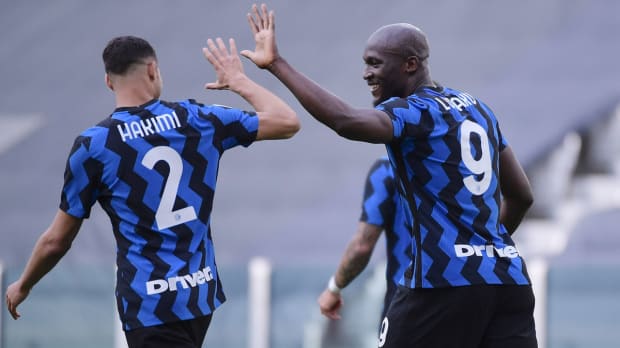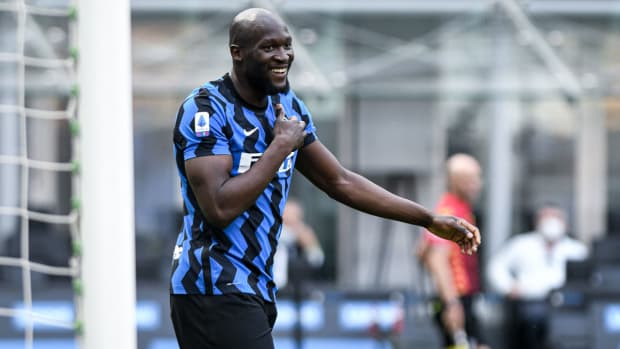Romelu Lukaku can cure what ailed Chelsea's attack last season, and he's only available due to Inter Milan's financial woes.
It is a basic feature of capitalism that in times of crisis the well-run, the fortunate and the wealthy feast upon those who are struggling. Romelu Lukaku has thrived over the past two seasons at Inter Milan, blossoming from an often ungainly and intermittently brilliant striker into perhaps the best orthodox center forward in the world. After helping Inter to a first Serie A title in 11 years last season, he had no great desire to leave.
But wider economic forces are at work. Inter had no choice but to reduce its debt, and the easiest way to do that is to sell its best players, including Lukaku to Chelsea for a reported fee of €115 million ($135 million). By the end of last season, Inter’s debts stood at a little more than $600 million, a situation complicated by the fact that its majority shareholder, Suning, has been told by the Chinese government that it must retrench.
That led the company to fold its Chinese Super League club, Jiangsu FC, just a few weeks after it won the title. In May, Inter signed a $336 million refinancing deal with the U.S.-based Oaktree Capital Management Group, using Suning’s 68.55% stake as collateral (that said, it’s believed Suning could buy out the other shareholder, LionRock, for $40 million as a result of an existing loan from Suning’s subsidiary Great Horizon to LionRock. It would be a repeat of what happened at AC Milan, where U.S. capital management group Elliott Management ended up taking on ownership after the club's previous owner, Li Yonghong, defaulted on a loan repayment that is still some way off).

Xinhua/Sipa USA
But with Suning also seeking to refinance two bonds worth $456 million that will expire next year, according to Forbes, it is not in a position to turn down a substantial lump sum. The Inter coach who won the title, Antonio Conte, quit when it became apparent how straitened finances would be, and it’s implausible the lack of investment in the squad would not also have a bearing on Lukaku’s decision. The club has already sold right back Achraf Hakimi to PSG for $70.9 million, and however happy Lukaku has been in Milan, it makes little sense for a player of his ability to spend his remaining peak years with a club struggling to finish in the top four in Serie A.
Enter Chelsea, one of Lukaku's former employers. The reigning European champion is in need of a striker, with Olivier Giroud offloaded to AC Milan and Thomas Tuchel clearly not especially impressed by Tammy Abraham, who last started a game for the club on Feb. 20 and is potentially off to Roma. Kai Havertz can operate as a false nine, but for that to be a long-term solution would require Timo Werner to be a more regular goalscorer than he was in his first season at Chelsea. It may be that with the focus taken off him, the former RB Leipzig forward becomes more consistent in front of goal.
Lukaku first joined Chelsea in 2011 when he was 18, but managed just 10 games for the club, instead enjoying successful loan spells at West Bromwich Albion and Everton, whom he joined on a permanent basis in '14. He is among a group of ex-Chelsea players including Kevin De Bruyne, Mohamed Salah, Patrick Bamford and Thorgan Hazard that the club perhaps regrets allowing José Mourinho to offload.

Piero Cruciatti/LaPresse/Sipa USA
This Lukaku, though, is very different even to the player who flickered inconsistently at Manchester United before putting it all together at Inter. He is an extraordinary mix of attributes, quick and extraordinarily powerful, but also deft and tactically astute. He can function both as a battering ram or out on the right flank into the space created by a false nine. As he showed for Belgium in the Euros, he can toil as a lone forward, cashing lost causes, forcing mistakes and holding the ball up, but he also has the slickness of a more orthodox center forward. And when he is confident, Lukaku is a very fine finisher.
It would be an extraordinary achievement for Chelsea even to challenge Manchester City this season, but Lukaku is the additional element who could make a challenge possible. After Tuchel took over at the end of January, Chelsea regularly dominated possession in games, but found goals hard to come by—just 38 scored in 30 matches in all competitions. Lukaku is a player who could both take the chances that are created but also generate chances of his own. Often Chelsea found itself playing sideways, without penetration; with Lukaku, quite apart from his movement and the possibility of sophisticated linkups with some combination of Havertz, Werner, Christian Pulisic, Mason Mount and Hakim Ziyech, there is always the option of simply lofting the ball into the box.
It’s a sorry outcome for Inter, of course, but probably a necessary one financially. For Lukaku and Chelsea, though, this could be hugely exciting.
More Soccer Coverage: